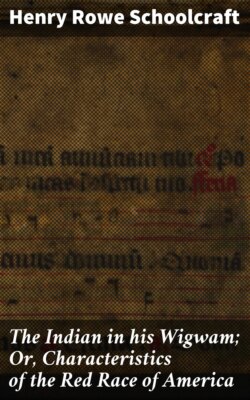Читать книгу The Indian in his Wigwam; Or, Characteristics of the Red Race of America - Henry Rowe Schoolcraft - Страница 16
На сайте Литреса книга снята с продажи.
Оглавление| Ka | Neej | Ka | Neej |
| Be | In | Be | In |
| Be | In | Be | In |
| Bon | In | Bon | In |
| Oc | Ee. | Oc | Ee. |
| Ca | We-ya! | Ca | We-ya! |
The number of words, in this song, are few and simple, but they are made up from compounds which carry the whole of their original meanings, and are rather suggestive of the ideas floating in the mind, than actual expressions of those ideas. Literally he sings:
Spirit of the North West—you are but my fellow man.
By being broken into syllables, to correspond with a simple chant, and by the power of intonation and repetition, with a chorus, these words are expanded into melodious utterance, if we may be allowed the term, and may be thus rendered:
Windy god, I know your plan,
You are but my fellow man,
Blow you may your coldest breeze,
Shingebiss you cannot freeze,
Sweep the strongest wind you can,
Shingebiss is still your man,
Heigh! for life—and ho! for bliss,
Who so free as Shingebiss?
The hunter knew that Kabebonicca was at his door, for he felt his cold and strong breath; but he kept on singing his songs, and affected utter indifference. At length Kabebonicca entered, and took his seat on the opposite side of the lodge. But Shingebiss did not regard, or notice him. He got up, as if nobody were present, and taking his poker, pushed the log, which made his fire burn brighter, repeating as he sat down again:
You are but my fellow man.
Very soon the tears began to flow down Kabebonicca's cheeks, which increased so fast, that, presently, he said to himself, “I cannot stand this—I must go out.” He did so, and left Shingebiss to his songs; but resolved to freeze up all the flag orifices, and make the ice thick, so that he could not get any more fish. Still Shingebiss, by dint of great diligence, found means to pull up new roots, and dive under for fish. At last Kabebonicca was compelled to give up the contest. “He must be aided by some Monedo,” said he, “I can neither freeze him, nor starve him, he is a very singular being—I will let him alone.”
The introduction of the Saxon race into North America, has had three determined opponents, the life of each of whom forms a distinct era. They were Powhatan, Metakom, and Pontiac. Each pursued the same method to accomplish his end, and each was the indominitable foe of the race.—Sassacus ought, perhaps, to be added to the number. Brant, was but a partisan, and fought for one branch, against another. Tecumseh, was also, rather the foe of the American type of the race, than the whole race. The same can be said of lesser men, such as Little Turtle, Buckanjaheela, and Black Hawk. Uncas was also a partisan, not a hater of the white race, and like Waub Ojeeg in the north, fought, that one tribe might prevail over another. If the Saxon race profited by this, he could not help it. Tuscaloosa fought for his tribe's supremacy; Osceola for revenge.
